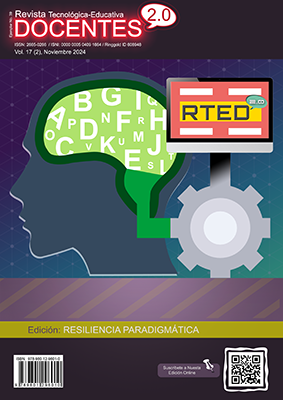Cuba, the Island that is not Forgotten or Forgiven
 DOI:
https://doi.org/10.37843/rted.v17i2.528
DOI:
https://doi.org/10.37843/rted.v17i2.528
Main Article Content
Abstract
Cuba is an island archipelago state in the Caribbean Sea. Colony of Spain until 1869, then under the protectorate of the United States lived a turbulent 20th century after the triumph of its revolution in 1959. One of the protagonists of the Cold War. Such events condemned him to neither be forgotten nor forgiven in the development of contemporary history. This research aimed to describe the experiences of a research internship with a group of professionals from Ayacucho, Peru. The research was based on the method of observation and analysis of texts, phenomenological and hermeneutical paradigms, with a qualitative approach, ethnographic design, and basic type whose record was left in a field diary. The process was observed and participated with a group of teachers from the Faculty of Social Sciences and Education. The pedagogical and research experiences occurred mainly at the Universidad de Oriente in Santiago de Cuba. After verifying the data and categories observed on the island, it was concluded that it continues with high revolutionary morale in constructing a new political, economic, and social system. Evidence of this is in his practice of Marxist humanism and his dedication to research as a priority of the educational system.
Downloads
Metrics
Article Details

This work is licensed under a Creative Commons Attribution-NonCommercial-NoDerivatives 4.0 International License.
Those authors who have publications in our journal accept the following terms:
- When a work is accepted for publication, the author retains rights of reproduction, distribution of his/her article for exploitation in all countries of the world in the format provided by our magazine and any other magnetic medium, optical, and digital.
- Authors will retain their copyright and guarantee the journal the right first to publish their work, which will be simultaneously subject to the Creative Commons Acknowledgment License (Attribution-NonCommercial-NoDerivatives 4.0 International (CC BY-NC-ND 4.0)). That allows third parties to copy and redistribute the material in any medium or format, under the following conditions: Acknowledgment - You must properly acknowledge authorship, provide a link to the license, and indicate if any changes have been made. You may do so in any reasonable way, but not in a way that suggests you have the licensor's endorsement or receive it for your use. NonCommercial - You may not use the material for a commercial purpose. NoDerivatives - If you remix, transform, or build from the material, you cannot broadcast the modified material. There are no additional restrictions - You cannot apply legal terms or technological measures that legally restrict you from doing what the license allows.
- Authors may adopt other non-exclusive license agreements to distribute the published version of the work (e.g., deposit it in an institutional archive or publish it in a monographic volume) provided that the initial publication in this journal is indicated.
- Authors are allowed and recommended to disseminate their work through the Internet (e.g., in institutional telematic archives, repositories, libraries, or their website), producing exciting exchanges and increasing the published work's citations.
- Request of withdrawal an article has to be done in writing by the author to the Editor, becoming effective after a written response from the Editor. For this purpose, the author or authors will send correspondence via e-mail: [email protected].
- The author will not receive financial compensation for the publication of his work.
- All Docentes 2.0 Journal publications are under the Open Journal System (OJS) platform at: https://ojs.docentes20.com/.
References
Bosch, J. (2009). Cuba, la isla fascinante. Miguel Ángel Porrúa.
Cabrera, Y. (2023). Mito y política en Cuba. Verbum, S. L.
Callejas Opisso, S., Loyola Vega, O., Díaz Pendas, H., López Civeira, F., & Rodriguez Ben, J. A. (2011). Historia de Cuba. Editorial Pueblo y Educación.
Constitución de la República de Cuba. (2019). Asamblea Nacional del Poder Popular (Il.). Universitaria.
Guevara, E. (1965). El socialismo y el hombre en Cuba. Grijalbo - Colección 70. DOI: https://doi.org/10.2307/40119406
Guevara, E. (1983). La planificación socialista. Fondo de Cultura Popular.
Dalband, H. (2023). Cuba, educación y desarrollo sostenible. Plaza y Valdés.
Tello Yance, F., Verástegui Borja, E. D., & Rosales Tabraj, Y. del C. (2016). El saber y el hacer de la investigación acción pedagógica. Impreso en dala inversiones dalagraphic E.I.R.L. Huancayo.
Gutiérrez, S. D. (2012). La formación y el control de los precios en Cuba. B - EUMED.
Llanio, G. (2008). Los caminos hacia el doctorado en Cuba. Universitaria.
López, F. (2006). Cuba y su historia. Gente Nueva.
López, D. L., & Martín, L. (2018). Cuba y América Latina: desafíos del legado revolucionario. CLACSO.
Maldonado, J. E. (2018). Metodología de la investigación social: paradigmas: cuantitativo, sociocrítico, cualitativo, complementario. Ediciones de la U.
Maxwell, J. A. (2019). Diseño de investigación cualitativa. Editorial Gedisa.
Páramo Reales, D., Campos Sierra, S., & Maestre Matos, L. (2020). Métodos de investigación cualitativa: fundamentos y aplicaciones. Editorial Unimagdalena. DOI: https://doi.org/10.21676/9789587463033
Quispe, A. (2019). El materialismo: visión comunista del mundo. Impreso en multiservicios A&C – Ayacucho.
Randall, G. (2010). Estar allí entonces: recuerdos de Cuba 1969-1983. Trilce.






